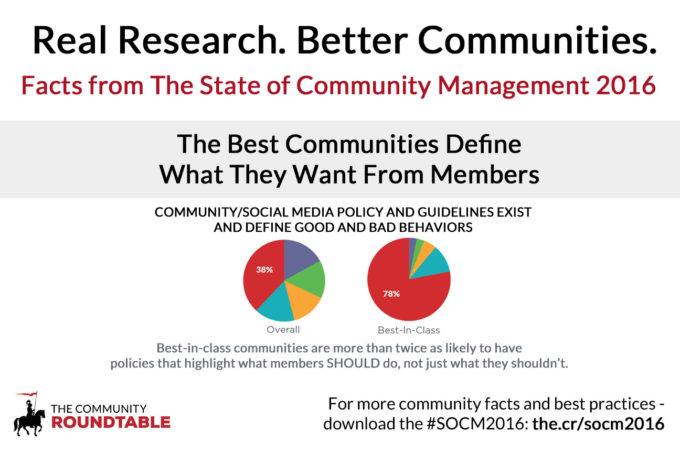By Ted McEnroe, Director of Research and Training
Rules. My 6-year-old hates them – but really she doesn’t. The same holds true for many communities.
 Communities – and 6-year-olds – tend to function best when there is some defined sense of appropriate behaviors. But there’s a catch. Policies and guidelines shouldn’t just explain what you shouldn’t do – they should highlight what you should. Once again this year, our best-in-class communities drive this home. The best communities are more than twice as likely as the average to have policies and guidelines in place that don’t just define what shouldn’t be done, but guide members to the behaviors that benefit the community.
Communities – and 6-year-olds – tend to function best when there is some defined sense of appropriate behaviors. But there’s a catch. Policies and guidelines shouldn’t just explain what you shouldn’t do – they should highlight what you should. Once again this year, our best-in-class communities drive this home. The best communities are more than twice as likely as the average to have policies and guidelines in place that don’t just define what shouldn’t be done, but guide members to the behaviors that benefit the community.
Before you say, “Duh!” – recognize that it’s a delicate balance. People don’t love being told what to do, or what not to do. But we need both. A community that works to have no rules or guidelines for expected behaviors can descend into the chaos of many media comments sections. But communities that are too restrictive can crush the constructive disagreements that are the heart of innovation and dialogue. The same holds true on the positive side – if a community doesn’t shape desired behaviors, it’s hard for members to figure out what to do. But being heavy-handed in saying what should be done can be as conversation-crippling as being heavy-handed about what shouldn’t happen.

So what’s a community manager to do? Here are a few ideas:
- Recognize the power of policies and guidelines as a positive force. If your policies and governance structure are solely designed to catch unwanted behaviors, you’re building a box, not a trellis for growth.
- Go back to your community values. What are the behaviors that lead to that value? Those are the ones you want to highlight in your policies and guidelines.
- Get community input. Community buy-in is critical for successful implementation of polices and guidelines. Getting members involved both improves the likelihood you’ll find the right language, and that when the hard decisions come you’ll have community support.
- Be transparent – about the process and the things that aren’t negotiable. Every organization has policies that protect key information and people – especially when it comes to legal requirements, confidentiality, and personal information. Be clear about those non-negotiables, and be upfront about other areas of disagreement. And as a crisis unfolds, share what you can with members. If you’ve effectively developed policies and guidelines, you’ll likely find more support than you might expect.
What are your best practices for community policies and guidelines? Share them in the comments.
We can’t wait to hear what you think – tag your thoughts with #SOCM2016 to join the conversation!
Are you a member of TheCR Network? Download the research inside the Network here.
